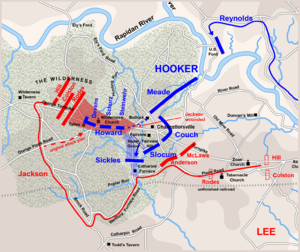Flanking maneuver facts for kids
A flanking maneuver (also called a flank attack) is a clever military tactic. It means attacking an enemy from their sides or from behind. Imagine two armies facing each other. Instead of a head-on attack, one army tries to move around to the enemy's side. If this works, the enemy might get surrounded. They would have to fight from two or more directions at once. This makes it very hard for them to move or defend themselves.

A flanking maneuver is different from an "envelopment." An envelopment tries to surround an enemy already in a strong defensive spot. A flanking maneuver uses the enemy's own forward movement. This creates a weak side for them to be attacked. This tactic can also create a big psychological advantage. When soldiers are attacked from many directions, it can cause confusion and panic. This often makes them run away from the battle. A larger version of this tactic is called a strategic flanking. This can involve attacking the sides of entire military divisions or even whole armies.
How a Flanking Maneuver Works
A flanking maneuver works best when the enemy is already busy fighting at their front. Often, a military force needs to be moved into a special position for a flank attack to succeed. The perfect situation is when the enemy's front line is narrow, but their sides (flanks) are long and exposed.
A famous example of a flanking maneuver happened during the American Civil War. Confederate General Stonewall Jackson used this tactic against the Union Army at the Battle of Chancellorsville in 1863. He marched his troops around the Union army's right side. This surprise attack caused a lot of confusion and panic among the Union soldiers.
Related Military Tactics
- Turning movement
- Ambush
- Envelopment
- Pincer movement (also called a double-envelopment)
- Rearguard
- Attrition warfare
- Feigned retreat
- Preemptive war
- Oblique order
- Shock tactics
Images for kids
-
The Battle of Marathon, an example of the double-envelopment, a form of flanking maneuver
See also
 In Spanish: Maniobra de flanco para niños
In Spanish: Maniobra de flanco para niños




